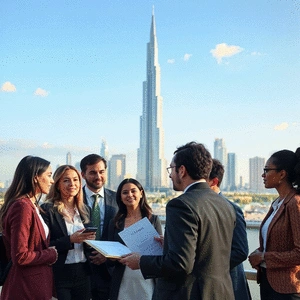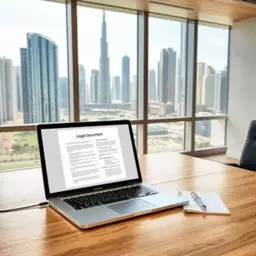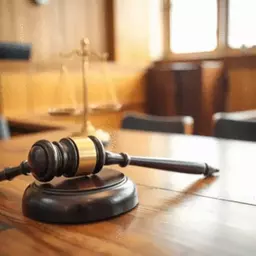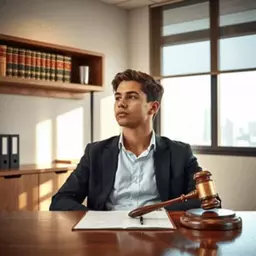Right to Know the Reason for Arrest
You must be informed promptly about the charges against you.
Subscribe for expert insights and crucial updates on criminal defense strategies in Dubai.
Posted on: 2025-09-23
By: Nadia Al-Farsi
When navigating the complexities of police detention in Dubai, understanding your rights can mean the difference between fair treatment and potential consequences. This guide aims to equip you with vital information to empower you during such encounters.
Understanding your rights is essential for fair treatment during police encounters. Below is a summary of critical rights you possess when detained.
You must be informed promptly about the charges against you.
You have the right not to incriminate yourself during questioning.
You can have a lawyer present during any police interactions.
If you need medical attention, you should receive it while detained.
You are entitled to a fair trial, including timely hearings and access to legal documents.
When you find yourself in a situation involving police detention in Dubai, it’s crucial to understand your rights. Imagine the fear and uncertainty that comes with being stopped by law enforcement. Knowing what to expect can make a world of difference! I’m here to help you navigate through this complex process and understand what your legal rights are.
In Dubai, the legal framework surrounding police detention can be complex. At its core, *arrest* refers to the act of taking a person into custody while *detention* involves holding someone for questioning. These terms can sometimes overlap, but they carry different implications in the eyes of the law. Being aware of these definitions is essential, as it sets the stage for your rights during such encounters. For a deeper understanding of the entire process, you can learn more about the understanding Dubai's arrest process.
Understanding this legal landscape allows you to advocate for yourself better. So, what does this mean for you? It means that being informed about the nature of your detention helps you respond appropriately when faced with authorities. Your rights are not just words; they are protections meant to ensure fair treatment.
In straightforward terms, *arrest* is when police take you into custody, usually because they believe you have committed a crime. *Detention*, on the other hand, can occur even if you haven't been formally charged. This could happen when police need to ask you questions or gather information. It’s important to note that both situations require adherence to certain legal guidelines.
Knowing your legal rights during police detention is not just empowering; it’s crucial for your defense. Many people feel overwhelmed and unsure, but understanding your rights can provide clarity. For instance, you have the right to know why you are being detained. This transparency is essential for ensuring justice and fairness.
Moreover, awareness of your rights can prevent potential abuses. Imagine being questioned without being informed of the reason—you could find yourself in a precarious situation! By knowing your rights, you strengthen your position and can respond confidently. For more on this, consider exploring defendant's legal rights in Dubai.
The UAE Penal Code provides a framework that governs criminal procedures, including police detention. This code outlines specific rights and obligations for both law enforcement and detainees. Familiarizing yourself with relevant laws can be incredibly beneficial for understanding what to expect.
Once you’re in police custody, it’s essential to remember that you do have rights. These rights help ensure you are treated fairly during detention. Here are some fundamental rights you should be aware of:
One of the first rights you must exercise is your right to know the reason for your arrest. Police are required to inform you why they are detaining you. This transparency is vital for your understanding of the situation and the legal process that follows.
When asked, they should provide clear information about the charges against you. If you’re unclear about anything, don’t hesitate to ask questions. Remember, you have the right to clarity!
Another crucial right is the right to remain silent. Think about it—anything you say could potentially be used against you in court. Exercising this right can be a smart move, especially if you’re unsure about the situation. By choosing not to speak, you give yourself time to think and avoid making statements that could harm your case.
Having access to legal representation is a fundamental right that shouldn’t be overlooked. If you are detained, you have the right to contact a lawyer. Having someone knowledgeable about the law can provide guidance and help protect your rights.
It’s beneficial to have a legal professional present during questioning. This can ensure that your rights are respected and that you understand the implications of any statements you make. Remember, you don’t have to face this alone! You can find valuable insights into legal support by exploring criminal defense strategies in Dubai.
When facing police detention, always remember to document the encounter as much as possible. If you can, take notes on the officers' names, badge numbers, and the exact time and place of the incident. This information can be crucial for your legal representation later on. Additionally, if there are any witnesses, ask them for their contact information, as they may provide valuable testimony in your defense.
As we wrap up our discussion on police detention in Dubai, it's essential to remember your fundamental rights and the procedures that govern them. Being informed empowers you to take the necessary actions should you ever find yourself in such a situation. From knowing the reason for your arrest to having access to legal representation, these rights are critical to ensuring fair treatment under the law.
It's also vital to understand the procedural steps you may encounter during detention. By familiarizing yourself with these processes, you can navigate the complexities more confidently. Remember, awareness is your first line of defense—knowing what to expect can ease the anxiety of an already stressful situation. For detailed steps, refer to steps after arrest in Dubai.
Let’s recap some of the key rights and procedures we've discussed:
These rights are designed to protect you, so never hesitate to invoke them if needed. In my practice at Dubai Legal Defense, I’ve seen how understanding these rights can make a significant difference in the outcome of a case.
When in doubt, seeking professional legal help is always a wise choice! The legal landscape can be intricate, and having an expert by your side can help clarify your options. A qualified criminal lawyer can provide valuable insights tailored to your unique circumstances, ensuring that your rights are upheld throughout the process.
Here are a few reasons why consulting with a lawyer is essential:
At Dubai Legal Defense, we believe in empowering individuals like you to navigate these challenges with confidence. Whether you are facing potential charges or are simply seeking more information, reaching out to a legal professional is a proactive step towards safeguarding your rights.
If you're looking for legal representation, here are some resources to help you find a criminal lawyer in Dubai:
These resources can connect you with the support you need when facing legal challenges. Don't hesitate to reach out and ensure your rights are protected.
In Dubai, arrest typically implies that a person is formally taken into custody because they are suspected of having committed a crime and charges are imminent. Detention, on the other hand, involves holding someone for questioning or investigation, which may or may not lead to formal charges. Both situations are governed by specific legal guidelines to protect your rights.
If detained, you have several fundamental rights, including the right to know the reason for your detention, the right to remain silent to avoid self-incrimination, and the right to legal representation. You also have the right to access medical care if needed and are entitled to procedural protections to ensure a fair process.
Yes, you have the right to remain silent. It is often advisable to exercise this right, especially before consulting with a lawyer, as anything you say could potentially be used against you in court. You can politely assert your right to remain silent and request legal representation.
Legal representation is crucial. A lawyer can provide expert guidance on local laws and procedures, ensure your rights are respected during questioning, and help you understand the implications of any statements you make. Having a legal professional by your side can significantly impact the outcome of your case and reduce stress.
You can find criminal lawyers through platforms like Dubai Legal Defense, the UAE Bar Association, or online legal directories such as Justia or Legal 500. These resources can help connect you with experienced legal professionals who can assist you with your specific situation.
Here is a quick recap of the important points discussed in the article:

 In the rapidly evolving financial landscape of Dubai, understanding white-collar crime is not just a
In the rapidly evolving financial landscape of Dubai, understanding white-collar crime is not just a
 Facing a criminal conviction can feel like being trapped in a labyrinth with no clear way out. Howev
Facing a criminal conviction can feel like being trapped in a labyrinth with no clear way out. Howev
 In a world where the juvenile criminal justice system is often viewed through a punitive lens, Dubai
In a world where the juvenile criminal justice system is often viewed through a punitive lens, Dubai